article_detail
Spanish News Today Editors Roundup Weekly Bulletin Nov 24
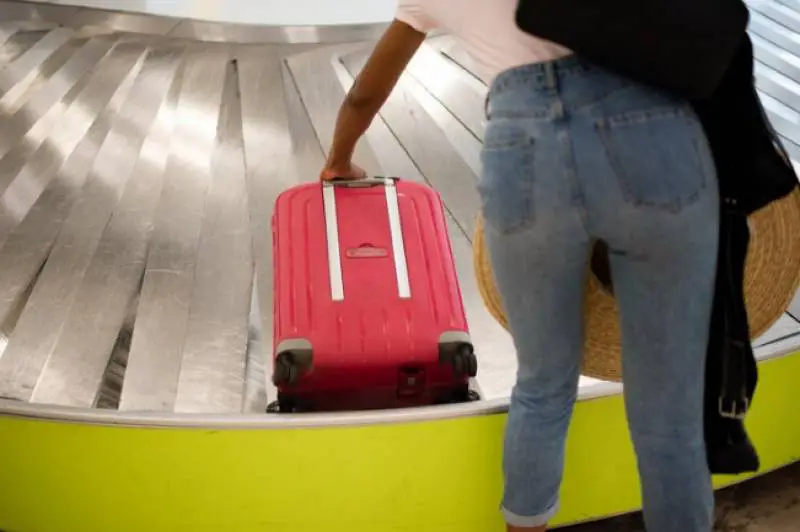
FEATURED ARTICLES: "Baggage handlers, Amazon workers and train staff go on strike in Spain" and "Costa Blanca’s last unspoilt stretch of coastline becomes housing development"
Happy Black Friday! Or, if you prefer, happy Buy Nothing Day. Which may be the case whether you like it or not since staff working in Amazon Spain’s notorious packing and processing plants are going on strike over this Black Friday and Cyber Monday shopping campaign season.
Baggage handlers in Spanish airports are also going on strike for the upcoming long weekend in Spain in early December, which could scupper many people’s travel plans. And railway workers were going to go on strike too, but they called it off at the last minute.
Perhaps what has people more riled up than industrial action, though, is commercial/residential action, after it was announced that a housing development on what has been termed one of the Costa Blanca’s last unspoilt stretches of coastline will go ahead, despite legal opposition on environmental grounds and a fierce outcry from the people who already live in the area.
But first…
British woman arrested as part of political murder and terror plot
…an update on the story of the Spanish politician who was shot in the face earlier this month.
This was Alejo Vidal-Quadras, 78, former PP member in Catalonia and one of the founders of VOX, who was shot in the face at point blank range just as he was walking down the street near his house in Madrid on November 9.

A man in a motorbike helmet walked up to him, calm as you like, put a bullet through his jaw, and ran off to jump on a waiting Yamaha that sped him away from the scene.
The attack just as the whole ‘amnesty’ business was coming to a head, and Vidal made some very scathing comments about the government and the Catalan separatists on X, formerly Twitter, just hours before his was shot. So at first most people assumed it had something to do with that.
But the story seems to have more plot twists than a James Bond thriller.
Three people were arrested this week for their part in the assassination plot, although none of them are thought to be the actual shooter. The arrests happened down in Andalucía.
The first was of a 22-year-old Spanish bricklayer in Fuengirola, Málaga who was paid a sum of money – around 500 euros – by a terrorist organisation to purchase the motorbike that would eventually become the getaway vehicle and put it in his name. That was back in September.
The other two detainees are another Spanish man and his British female partner, who were arrested in the town of Lanjarón, Granada.
What exactly the Brit’s role is in this sordid affair is still not clear but it’s thought that her Spanish partner – a convert to Shiite Islam and and a follower of the Ayatollah of Iran. Police are nowhere near done with their investigations yet, and so are keeping pretty tight-lipped about the whole thing.
They have, however, said that they are now on the hunt for a French man of Tunisian descent whom they believe was the one who pulled the trigger, and who is wanted in France for another murder. They also believe that another party could be involved as the one who paid this hitman in the first place.
As if that weren’t enough international intrigue, Vidal himself, who miraculously survived the attack and woke up in hospital just a few hours later, managed to tell police (despite the fact he’d just been shot in the jaw) that he thought the state of Iran was behind the attack, since he is such a vocal critic of the Iranian regime and a close collaborator with the National Council of Resistance of Iran.
While the Iranians haven’t explicitly denied the accusations, they have stated that they, like everyone, wholeheartedly denounce terror attacks. The High Court in Spain is treating this as a possible terrorist offence.
Lucky strike

It seems that every month some group or other is going on strike in Spain, which is understandable really given the rising cost of living and wages and working conditions that are usually under par compared to many other European countries. But this week has really taken the biscuit, with three major entities threatening to down tools on some of the busiest travel and shopping days of the year.
The biggest hoopla was caused by Renfe and Adif railway workers, who announced five days of 24-hour strikes on November 24 (Black Friday) and 30, as well as on December 1, 4 and 5.
Now, we won’t bore you with politics as we’ve had quite enough of that over the last couple of weeks, but the reason for the discontent stems from Pedro Sánchez’s desperate bid to secure another four years as President of the Spanish Government. As we know, he made a series of controversial deals to guarantee his investiture, and one of these agreements was transfer the management of Rodalies, Catalonia’s commuter train network, over to the regional government.
The problem, as far as the workers were concerned, was that not one mention was made of how this transfer would affect their contracts, pay or working conditions, so they called the strike in protest.
To everyone’s great relief, at the eleventh hour the Ministry of Transfer guaranteed that nothing at all would change for Renfe and Adif workers, and the industrial action was cancelled just hours before it was due to kick off.
In the meantime though, Renfe had cancelled more than 1,500 services in anticipation of the strike and rescheduled the effected passengers onto alternative trains. At the time of writing, the company is scrambling to contact all of these customers and switch them back to their original bookings.
Not a pleasant job, but hopefully it’s not enough to trigger another strike!
Railway workers aren’t the only unhappy campers, however, as baggage handlers have called a strike at every Aena airport in Spain next month, which is pretty much all the major airports in the country. The dates haven’t been finalised, but the work stoppages will happen sometime between December 4 and 10, which takes in the long weekend.
The airport unrest is more about workers’ rights than pay; Aena recently put the management of its ground services out to tender and Iberia, who has run these services throughout Spain for years, lost out on eight airports. The contracts were instead awarded to several different companies, many of which have been hauled before the courts in the past for abusing staff in one way or another.
This new management structure has caused “uncertainty”, according to the unions, which have accused Aena of putting savings ahead of “establishing a real, concrete and clear commitment” to staff.
If the industrial action goes ahead, it will undoubtedly cause untold chaos, delays and possibly even flight cancellations in airports across Spain.
They say that misfortune comes in threes, and making up the strike action trio is retail giant Amazon, whose staff will come to a standstill for one hour per shift on November 27 and 28. This will of course impact the Black Friday and Cyber Monday campaigns, since the stoppages will delay orders being processed, packaged and sent out for delivery.
The CCOO union claims that the industrial action is to protest the “insufficient protection of occupational health suffered by the workforce and salaries that do not recognise the responsibilities and demands set by the company.”
“Amazon pays the minimum wages of the sector of each province. This is neither a correct decision nor is it fair,” a union spokesperson said.
It’s difficult to see how Amazon and its employees will reach a compromise, however, since the company insists that its staff work in a modern and safe environment. Moreover, the online retailer claims that most of its workers earn “at least 1,400 euros per month,” which is well above the Spanish minimum wage.
In a similar vein, some 200 staff working at H&M Customer Services offices in Spain will shut up shop on November 24. Employees of the fashion retailer are asking for higher salaries and better working conditions.
Going, going, gone
It’s fair to say residents of Orihuela Costa, on the Costa Blanca, don’t have an easy time of it, tucked away from the big boys in the city who make all the decisions and often seem out of touch with the needs of the coastal resorts. Case in point is a decision this week to green light the development of more than 2,200 homes along the N-332 on Playa Flamenca’s Cala Mosca frontline, ‘the last unspoiled corner’ of the costa.
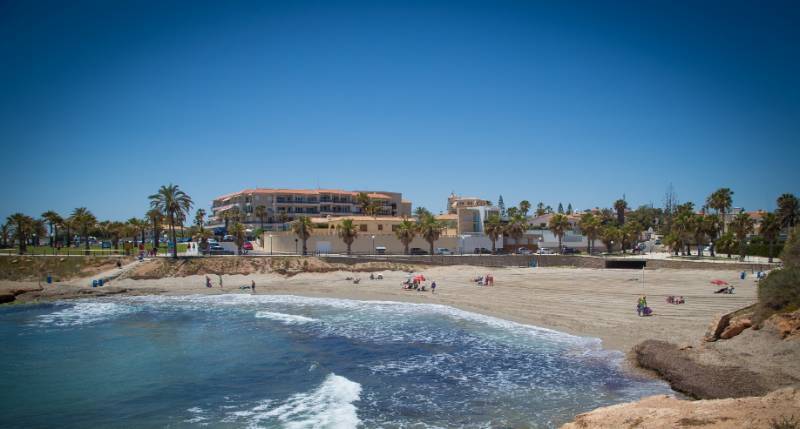
The future complex was actually paralysed by the EU way back in 2010 when it was discovered that the land is a habitat for several protected species and the whole thing has been tied up in court in the intervening years.
But now that the developer has agreed to fence off 60,000 square metres of the plot for a nature micro-reserve, everybody’s happy and the houses, car parks and playgrounds will be built.
Well, not everybody’s happy, naturally. Residents are up in arms that the beautiful coastline view will be blotted out by yet more buildings, but there are practical problems too.
The N-332 dual carriageway can barely handle the traffic it has to deal with now, and every day cars are at a standstill for miles in jams. There are plans to add extra lanes further down the road by Torrevieja, but this is in response to the current need, and doesn’t address the congestion that will be caused by thousands more homeowners.
If the road network was an issue, it’s nothing compared to the sewage system. This too was designed to deal with a far smaller population that what exists today, and every summer the treatment plant gets backed up and spews waste onto the beaches.
That’s not something real estate agents for the new development are likely to include in their marketing campaigns.
Neighbourhood groups like Save Cala Mosca are strongly opposed to the development and have promised to keep fighting against it. However, while there is still technically room for further appeals, the diggers and builders already on site tell a different story.
Murcia
If you heard a loud explosion around the Costa Cálida area this Tuesday just gone, don’t be alarmed. It was just a superfast RAF fighter jet zooming through the sky faster than the speed of sound.
Nothing to do with Russia or North Korea. They’re just supersonic military drills from jet planes, which take place periodically in this area of the Mediterranean.
 In this case, the loud boom this Tuesday was from two Eurofighter Typhoon aircraft belonging to the Royal Air Force which broke the sound barrier and made a loud sonic boom that was heard as a crack like a bomb or sudden thunder, and scared several people so much that they called the police to report it.
In this case, the loud boom this Tuesday was from two Eurofighter Typhoon aircraft belonging to the Royal Air Force which broke the sound barrier and made a loud sonic boom that was heard as a crack like a bomb or sudden thunder, and scared several people so much that they called the police to report it.The planes took off from the Base Aérea de Los Llanos airbase in Albacete, and more manoeuvres are scheduled to take place every afternoon for the next couple of weeks, until the end of the month. So now you know, don’t be alarmed!
If you heard a loud booming noise on Wednesday night, however, it may not have been a sonic boom but rather than roll of thunder.
Although no storms were forecast for this week, residents of La Manga and Cabo de Palos, right on the seashore, were surprised shortly before midnight on Wednesday by the roar of thunder and a fearsome display of sheet lightning that lasted for 40 minutes.
The accompanying hailstorm and pelting rain lasted all night long, soaking the streets of these Cartagena localities and bringing gusts of wind of up to 40kmh. But where did it come from without any warning, and why didn’t meteorologists know about it?
Well, they did, kind of. It was part of a storm system in the south of Sicily, in Italy. Of course they knew it was there, but their predictive system just never thought it would reach as far across the Mediterranean Sea as it did.
Assuming that the weather is fine and there are no more nasty surprises, you might fancy a sail on the Mar Menor lagoon while the sun’s shining. If you’ve ever seen the sailing boats out on the water there, you may have been tempted to try your hand at this sport.
Problem is, it’s not exactly cheap. First of all, you’ve got to buy yourself a whole boat if you want to go out and practise regularly. Or do you?
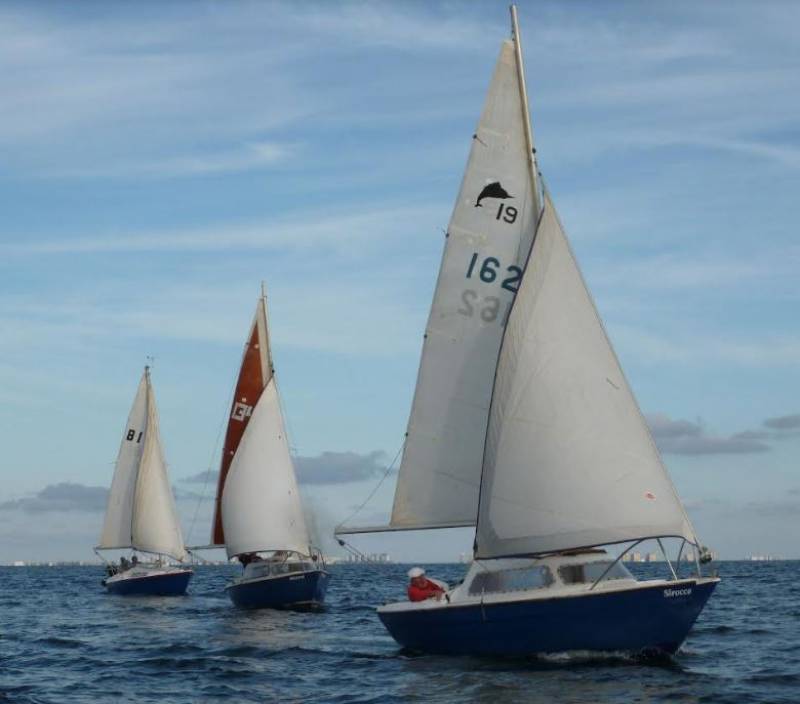 The sailing club ‘International Balaton Group of the Mar Menor’ has shared the secret of how to enjoy this water sport without the massive initial investment that sometimes puts people off. The club jointly owns, maintains and sails four 6-metre day sail boats for members to be able to take out. This form of group ownership keeps the cost of sailing down, so you can try out this sport without having to purchase or rent a full boat.
The sailing club ‘International Balaton Group of the Mar Menor’ has shared the secret of how to enjoy this water sport without the massive initial investment that sometimes puts people off. The club jointly owns, maintains and sails four 6-metre day sail boats for members to be able to take out. This form of group ownership keeps the cost of sailing down, so you can try out this sport without having to purchase or rent a full boat.Perhaps best of all, it also provides members with a large group of international friends to sail with!
Talking of groups who share a common interest, there was a very interesting story this week coming out of the small town of Abanilla in central Murcia. There is a Buddhist temple and community there – with an enormous, colourful statue of a serene-looking Buddha sitting on the mountaintop and overlooking the complex – that has been the headquarters for a spiritual sect for many years now, with the guru providing meditation guidance and spiritual aid to many people interested in eastern religions and philosophy, and the understanding of mind and self that they can bring.
Well, this week the leader of this community was arrested for selling poisonous drugs to his followers.
A crack squad from the National Police force’s ‘Cults Group’ stormed the compound and arrested 50-year-old José Manuel Cánovas Rivera, who preferred to be called ‘Transcendencia Total’ (meaning Total Transcendence). He is accused of using mercury as a base ingredient to manufacture illegal and harmful substances in a warehouse on an industrial estate in Lorquí, and then selling it to the faithful who followed him on the understanding it would be taken as a sort of hallucinogenic aid to meditation.
Mercury, of course, is highly toxic when consumed, so not only is T.T. being charged with drug trafficking and the supply and marketing of products and medicines, but also crimes against public health.
The man left Spain we he was just 19-years-old, in 1993, to study under the Hindu and Buddhist masters in the part of India where most of the Tibetan exiles live. He was there for a full 12 years, reading the vedas and the scriptures, practising meditation and trying to find liberation from the cycle of suffering by non-attachment to the illusory material plane. Then he returned to his native Murcia and founded the Mahasandhi community and that’s when things took a turn for the weird.
When police searched his compound, they also found concealed rooms behind wardrobes and illicitly obtained firearms, and former members of the group have since come forward with claims that they were encouraged to give all their money to the foundation and that there may possibly have been instances of abuse, whether physical, psychological or sexual is unclear.
So much for inner peace! Have a look at this video below of police searching the compound:
ð© La @policia detiene al líder espiritual de una comunidad que suministraba "mercurio purificado" a sus adeptos
— Policía Nacional (@policia) November 22, 2023
ð¹Se ha registrado el complejo de la comunidad y se han intervenido casi 200 kg de #mercurio
ð¹Se inició investigación por un correo a: sectasdestructivas@policia.es pic.twitter.com/DHI7x1Oa9p
On a slightly different note, don’t miss out on a visit to see the Christmas lights in Murcia city, which are being turned on tonight, Friday November 24, at 8pm, and in Cartagena, where the date for the big switch-on has been pushed back from Friday December 1 to Tuesday December 5.
Check out our EVENTS DIARY for more ideas of what to do in the Region of Murcia:
Spain
Spain is continuing to make its mark on the global culinary scene and earlier this week a Spanish cook won the prestigious ‘Best Chef Award’ for the third year running.
The coveted list showcased the 100 best chefs in the world and for the third consecutive year, first place was awarded to Spain’s very own Dabiz Muñoz, from the avant-garde fining dining restaurant DiverXO.

It was certainly a bumper celebration for Spain: four other Spaniards made it into the top 10, the most notable being Albert Adrià, from Enigma in Barcelona, which took second place.
Boasting three Michelin stars along with three Best Chef awards, DiverXO in Madrid is renowned for its creative approach to cooking, fusing both Asian and Spanish influences, and surprising and delighting diners with innovative pairings and unusual presentations.
Back to trains, for a minute, and private company Nightjet has announced plans to connect Barcelona and the rest of Europe with luxurious overnight trains from the end of 2024.
Spain is actively promoting train travel and pumping huge amounts of money into improving its railway network, even to the point that they are considering banning short-haul flights for journeys that can be made by train in under two and a half hours.
 This backing of train travel will undoubtedly get a boost thanks to Nightjet, whose ultimate goal is to connect 13 European cities through a network of high-quality overnight trains. The initial phases, which began two years ago, already link the European cities of Vienna, Munich, Zurich, Cologne, Amsterdam and Rome with these night trains, and Berlin, Brussels and Paris are planned for the end of this year.
This backing of train travel will undoubtedly get a boost thanks to Nightjet, whose ultimate goal is to connect 13 European cities through a network of high-quality overnight trains. The initial phases, which began two years ago, already link the European cities of Vienna, Munich, Zurich, Cologne, Amsterdam and Rome with these night trains, and Berlin, Brussels and Paris are planned for the end of this year.The exciting news for Spain is that the company will launch direct night train services between Barcelona and Zurich in December 2024, with the ultimate plan of linking the northern Spanish city with Basel, Berlin, Brussels, Cologne, Florence, Hamburg and Milan. Even better, it’s hoped that basic tickets will cost as little as 50 euros each way, while there are also private sleeper cars and shared bunk cabins that are available for a little more.
Alicante
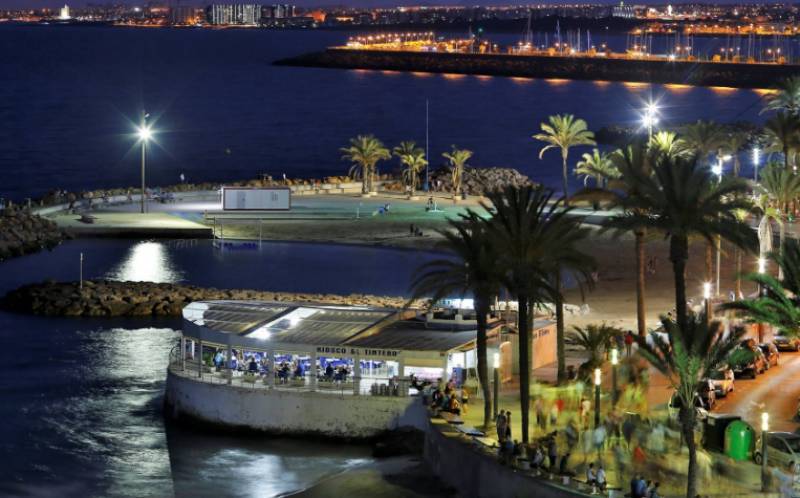 The coastal authorities, or Costas as they are simply known, have made a few controversial decisions recently, but they’ve really rubbed Torrevieja locals and visitors up the wrong way this week. On Thursday November 24, people woke to the depressing sight of workers tearing down the El Tintero kiosk, a beachside bar and restaurant that has stood overlooking the Med for more than 80 years.
The coastal authorities, or Costas as they are simply known, have made a few controversial decisions recently, but they’ve really rubbed Torrevieja locals and visitors up the wrong way this week. On Thursday November 24, people woke to the depressing sight of workers tearing down the El Tintero kiosk, a beachside bar and restaurant that has stood overlooking the Med for more than 80 years.Torrevieja City Council have been fighting against the demolition of the iconic building and even went so far as paying almost 10,000 euros to commission a report that would declare the kiosk an Asset of Local Relevance, but for some unknown reason this hasn’t arrived on time.
The Costas argue that El Tintero is sitting on public land and so shouldn’t be allowed to benefit financially.
El Tintero is as much a part of the Costa Blanca resort’s landscape as the salt lakes or lagoon. Decades ago, the grandfather of the current owners opened the kiosk as a place to dye fishing gear, hence the name. It has since transitioned into one of Torrevieja’s best-known bar-restaurants, jutting out over the Mediterranean and serving some of the tastiest seafood around.
The harassed family has been battling against the closure for the past 12 years or so but eventually admitted defeat and locked the doors.
Now, the family has no idea what will become of their legacy, as it’s not clear whether the management of the Costa plans to limit itself to removing the awnings and other added structures, or will go on to completely demolish the kiosk.
 There’s no shortage of dodgy TV systems doing the rounds in Alicante but the police are cracking down on fraudsters offering hundreds of international channels which they have no licence for. This week, a British expat was collared for selling pirate IPTV subscriptions to bars and restaurants all over Benidorm.
There’s no shortage of dodgy TV systems doing the rounds in Alicante but the police are cracking down on fraudsters offering hundreds of international channels which they have no licence for. This week, a British expat was collared for selling pirate IPTV subscriptions to bars and restaurants all over Benidorm.It was actually a broadcaster who first reported the scam when he saw an ad on social media offering his sports channel – which real customers pay a premium for – a ridiculously low price. It later transpired that the same man was selling subscriptions for English, Irish and Scottish TV, as well as the expensive sports packages.
The packages were selling for between £7 and £50, with the top choice offering 594 television stations. All of the payments were made to a UK bank account.
According to the 62-year-old Brit’s own profile, he had spent “ten years supplying IPTV to bars and restaurants in Benidorm with support 24 hours a day, seven days a week.”
When police searched his Benidorm house, they discovered he had raked in close to 200,000 euros through the scam. He has since been arrested for a crime against intellectual property related to the market and consumers.
Andalucía
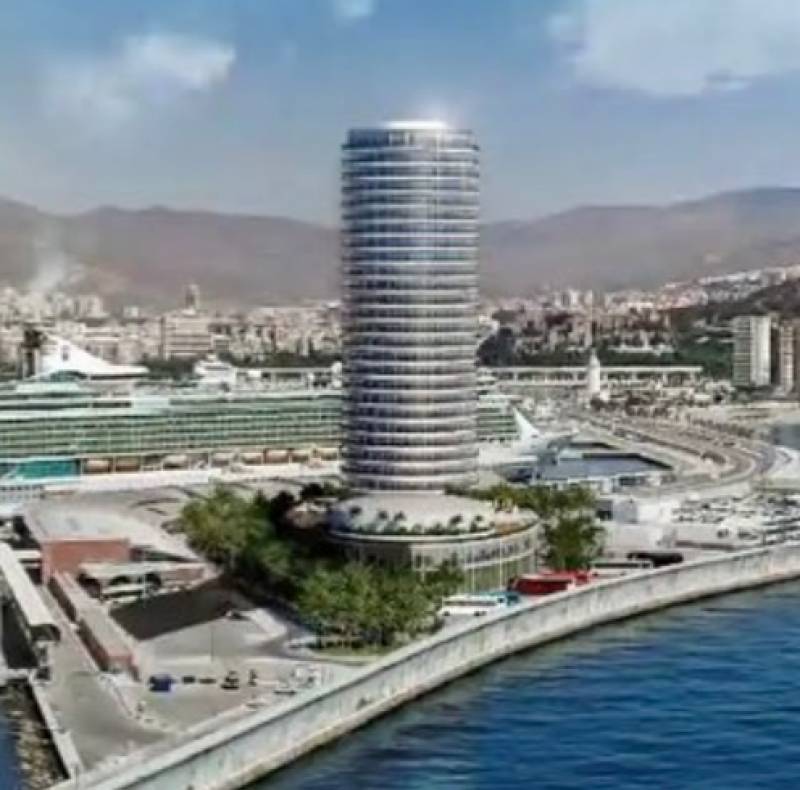 Much to the annoyance of local residents, the Urban Planning Commission has given the go-ahead to the building of a 150-metre high hotel right on the waterfront of the Port of Málaga.
Much to the annoyance of local residents, the Urban Planning Commission has given the go-ahead to the building of a 150-metre high hotel right on the waterfront of the Port of Málaga.The five-star tower will soon dominate the skyline on the Morro Platform, between piers 1 and 2.
Plans were initially submitted for the 38-floor tower building in 2016 with the Authority hoping to open the luxury accommodation by 2020. But the proposal has faced fierce opposition from local residents and politicians, many of whom claim the building will be an “aberration” that will block the view of many historical landmarks, like the La Farola lighthouse.
Now though, the planning legislation government the Port of Málaga has been amended to allow the hotel to be built despite widespread dissent, and president the Port Authority Carlos Rubio is confident that the luxury hotel will be open for business before the end of next year.
Anyone who’s spent even the shortest of time in Spain will know that the locals are a talkative bunch. What should be quick jobs like running to the bank or picking up a loaf of bread can turn into monumental tasks as those in front of us in the queue seem happy to chatter away for hours.
But from where in Spain, you might ask, do the most chatterboxes hail? It turns out that Andalucía is home to three of the most talkative cities in the nation – Córdoba, Granada and Sevilla, which all made it into the top 5.
In a recent survey that rated each Spanish city for its talkativeness, Córdoba came in at the very top of the list with a score of 6.80, followed by Granada in second place with 6.70. Sevilla drops a position to fourth with 6.56 points.
Rivalling the Andalusians for their love of lively conversation is the favourite British holiday destination of Palma de Mallorca, where a very respectable score of 6.60 puts it in second place. Rounding off the top 5 are Vigo and La Coruña, both with 6.55.
Across the country, the average Spaniard talks to six people a day outside of work, but what might surprise some people is that the score is practically identical between men and women.

You may have missed…
- Spanish traffic cops employ new mobile ITV checks.
Police checkpoints in Spain can now inspect the condition of vehicles on the spot! - Gas Appliances: Timely advice from TJ Electricals that could save your life.
With nights drawing in and starting to get chillier, trusty gas heaters are being revived from their summer hibernation, but a few simple checks could save some unexpected problems which could have serious consequences. Here is some advice from TJ Electricals/Euronics Camposol after a customer visited their store with a problematic and potentially dangerous gas heater... - New free car parks being built in Cartagena.
Cartagena City Council has approved the creation of two new car parks, to be located next to the Mandarache and La Rambla shopping centres, which between them will have more than 800 parking spaces. - Shakira pleads guilty to tax evasion and avoids 8 years behind bars in Spain.
Colombian superstar Shakira has agreed to pay a million-dollar fine and will avoid a prison sentence after admitting before the Barcelona Court on Monday November 20 that she defrauded the Spanish Treasury of 14.5 million euros between 2012 and 2014. - When the Christmas lights are turned on in Andalucia: Xmas guide to all 8 provincial capital cities.
These are the dates on which the Christmas lights are expected to be switched on in each of the eight provincial capital cities of Andalucía. Note that almost half of them are being switched on this Friday!
And that’s all for this week. Thanks for reading, as ever, and we’ll be back next week.
Bye!
Contact Spanish News Today: Editorial 966 260 896 /
Office 968 018 268

















